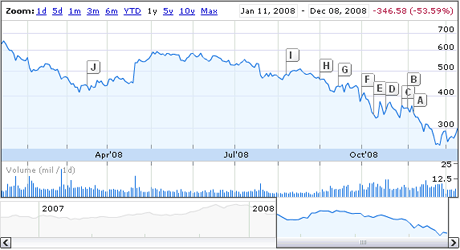For the last ten years search engine marketers have played by Google’s rules. In that decade Google has effectively done as they pleased, growing into one of the true giants of today’s business world. While Google is by no means at risk of closing their doors, it is worth noting that no one – including Google – is immune from the economic recession that troubles the global financial markets.
If you pay attention to any of the mainstream media reports you know that much focus is now placed on the trends of consumers and their spending habits. When spending appears to be up stocks rally and profits are raked in. At the first sign of a dip, sell offs weaken the markets and merchants begin to second guess their advertising initiatives.
Despite being one of the easiest advertising channels to prove effective, Internet advertising is always called into question.
While the world worries about the price of oil and the value of the of the dollar against global currency, I will argue that not enough attention is placed on the stability of Internet stocks. I understand that we’re not living in 2002, but consider the instability that plagues our national landscape of ‘Net stocks. And dare I say, Google is at the heart of it all. As a company that pulls in 97% of their revenue from online advertising, Google is arguably more at risk to these violent shifts in consumer spending than anyone else in the field.
According to a recent Wall Street Journal article, Google CEO Eric Schmidt said that engineers may not be given as mcuh opportunity for the 20% free time projects they once enjoyed. That’s a bit contradictory to the Google Culture they love to tell us about all the time. The sad truth though is that too few of these “20 percent projects” actually became useful for the public.
It’s no secret that Google can’t get much right outside of search and related advertising. The past ten years have been littered with failed initiatives including Froogle, Dodgeball, Jaiku, Click-to-Call and Catalogs. That list will continue to grow as Schmidt indicates that Google Lively will be pulled same as SearchMash was in November.
Despite Google’s best efforts to sway public opinion, financial analysts were keen to these problems one year ago. Revenue and profits fell short of expectations in the fourth quarter of 2007 but Google rallied by posting growth through the first two quarters of 2008. As the holiday season continues on though, that growth has slowed dramatically leaving the future uncertain.
Healthy Financial Markets Fuel Google’s Growth
We cannot restrict the view of consumer spending on products and trends relative to the holiday season either. As search engine marketers, most of our readers are well aware of the competitiveness that comes with certain industries.
While automotive and real estate verticals have long been hammered, their financial markets are tightening up to the point that layoffs and losses are happening daily. When fewer opportunities exist for auto loans, mortgages and refinancing opportunities – large advertising segments become threatened. From my stance, it is this core of advertisers that put Google’s long term stability at risk.
When these markets are weakened, so too is Google. Look no further than the past year of Google’s street value as determined by Wall Street.

The above represents the past year of trading activity on Google’s stock (GOOG) as recorded at Google Finance, including a 53.59% decline in stock price since January 11, 2008. Google’s stock traded at an all time high of $741.79 in November 2007.
New Personnel for an Uncertain Future
Much like the rest of the economy, Google’s future is one that will require a change in spending and a change in internal financial management. Their tighter cost controls have helped them to avoid layoffs in these tough times – a fate that Yahoo! has found unavoidable.
Recent acquisitions also suggest that Google is trading in their freedom and fun times for hardened financial management. They brought Patrick Pichette in as their new CFO in June and have retooled much of their financial team with a number of other acquisitions as well.
As global ad spending is forecasted to fall in 2009 these new members inside the Googleplex may indeed be required.
And let’s not forget the whole Department of Justice scare and any future possibilities…
Eric Lander is a veteran search engine marketer who manages an independent consulting practice and blog. All information in this article is provided “as is” for readers of Search Engine Journal. This article and related resources are not intended for trading purposes and should not be used as financial advice.




